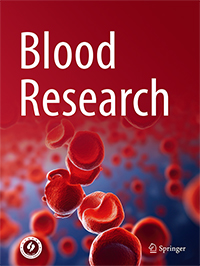Original Article
 Split Viewer
Split Viewer
Blood Res 2015; 50(3):
Published online September 22, 2015
https://doi.org/10.5045/br.2015.50.3.173
© The Korean Society of Hematology
The efficacy of bypassing agents in surgery of hemophilia patients with inhibitors
Department of Pediatrics, Kyung Hee University Hospital at Gangdong, School of Medicine, Kyung Hee University, Seoul, Korea.
Correspondence to : Correspondence to Young Shil Park, M.D., Ph.D. Department of Pediatrics, Kyung Hee University Hospital at Gangdong, 892, Dongnam-ro, Gangdong-gu, Seoul 05278, Korea. Tel: +82-2-440-6133, Fax: +82-2-440-7175, pysmd@khnmc.or.kr
This is an Open Access article distributed under the terms of the Creative Commons Attribution Non-Commercial License (http://creativecommons.org/licenses/by-nc/4.0) which permits unrestricted non-commercial use, distribution, and reproduction in any medium, provided the original work is properly cited.
Background
Inhibitory antibodies to factor VIII (FVIII) or IX (FIX) are important issues when managing patients with hemophilia A or B. Advances in bypassing agents such as recombinant activated FVII (rFVIIa) and activated prothrombin complex concentrates (APCC) have enabled the aggressive management of hemophilia with inhibitors during emergency or elective surgery. This study provides an updated evaluation of the safety and effectiveness of bypassing agents in treating perioperative bleeding.
Methods
We reviewed the records of hemophilia patients with inhibitors who underwent surgery between May 2008 and July 2014 using bypassing agents or high-dose FVIII concentrates at a single center.
Results
In total, 36 surgeries (24 orthopedic, 12 other) were conducted in 18 hemophilia patients with inhibitors. The median inhibitor titer at surgery was 14 (range, 0.7-1,900) Bethesda units. Most patients had high-responding inhibitors. In total, 25 patients received APCC, 9 with rFVIIa initially. In most cases, bleeding stopped or was well controlled; however, bleeding in 6 patients was controlled using sequential bypassing therapy. Hemostatic efficacy of bypassing agents in various surgeries, based on the final patient outcome, was 94.4% (34/36). Among 5 emergency surgeries, 2 deaths occurred.
Conclusion
Good control of hemostasis can be achieved using bypassing agents in hemophilia patients with inhibitors who are undergoing surgery. Thorough planning is needed before elective surgery and more active and aggressive management may be needed for emergency surgery. Use of bypassing agents can facilitate safe and successful surgeries in hemophilia patients with inhibitors.
Keywords Hemophilia, Inhibitor, Bypassing agent, Surgery
Article
Original Article
Blood Res 2015; 50(3): 173-178
Published online September 22, 2015 https://doi.org/10.5045/br.2015.50.3.173
Copyright © The Korean Society of Hematology.
The efficacy of bypassing agents in surgery of hemophilia patients with inhibitors
Hee Young Ju, Hye Lim Jang, and Young Shil Park*
Department of Pediatrics, Kyung Hee University Hospital at Gangdong, School of Medicine, Kyung Hee University, Seoul, Korea.
Correspondence to: Correspondence to Young Shil Park, M.D., Ph.D. Department of Pediatrics, Kyung Hee University Hospital at Gangdong, 892, Dongnam-ro, Gangdong-gu, Seoul 05278, Korea. Tel: +82-2-440-6133, Fax: +82-2-440-7175, pysmd@khnmc.or.kr
This is an Open Access article distributed under the terms of the Creative Commons Attribution Non-Commercial License (http://creativecommons.org/licenses/by-nc/4.0) which permits unrestricted non-commercial use, distribution, and reproduction in any medium, provided the original work is properly cited.
Abstract
Background
Inhibitory antibodies to factor VIII (FVIII) or IX (FIX) are important issues when managing patients with hemophilia A or B. Advances in bypassing agents such as recombinant activated FVII (rFVIIa) and activated prothrombin complex concentrates (APCC) have enabled the aggressive management of hemophilia with inhibitors during emergency or elective surgery. This study provides an updated evaluation of the safety and effectiveness of bypassing agents in treating perioperative bleeding.
Methods
We reviewed the records of hemophilia patients with inhibitors who underwent surgery between May 2008 and July 2014 using bypassing agents or high-dose FVIII concentrates at a single center.
Results
In total, 36 surgeries (24 orthopedic, 12 other) were conducted in 18 hemophilia patients with inhibitors. The median inhibitor titer at surgery was 14 (range, 0.7-1,900) Bethesda units. Most patients had high-responding inhibitors. In total, 25 patients received APCC, 9 with rFVIIa initially. In most cases, bleeding stopped or was well controlled; however, bleeding in 6 patients was controlled using sequential bypassing therapy. Hemostatic efficacy of bypassing agents in various surgeries, based on the final patient outcome, was 94.4% (34/36). Among 5 emergency surgeries, 2 deaths occurred.
Conclusion
Good control of hemostasis can be achieved using bypassing agents in hemophilia patients with inhibitors who are undergoing surgery. Thorough planning is needed before elective surgery and more active and aggressive management may be needed for emergency surgery. Use of bypassing agents can facilitate safe and successful surgeries in hemophilia patients with inhibitors.
Keywords: Hemophilia, Inhibitor, Bypassing agent, Surgery
-
Patient demographics. a)Severe hemophilia was defined as <1% clotting factor level..
Abbreviation: BU, Bethesda unit..
-
Details of the cases and procedures. Abbreviations: FVIII, factor VIII concentrate; APCC, activated prothrombin complex concentrates; rFVIIa, recombinant activated factor VII; NA, not applicable; Seq, sequential..
a)Procedures for N2 and N3 were done on the same day..
-
Surgeries performed. Abbreviations: ICH, intracranial hemorrhage; PICC, peripherally inserted central catheter..
-
Patient progress and outcomes. Abbreviations: FVIII, factor VIII; APCC, activated prothrombin complex concentrates; rFVIIa, recombinant activated factor VII..
-
Patients who underwent surgery under emergency conditions. Abbreviation: ICH, intracranial hemorrhage..

Article Tools
Stats or Metrics
Related articles in BR
-
Sequential therapy with activated prothrombin complex concentrates and recombinant activated factor VII to treat unresponsive bleeding in patients with hemophilia and inhibitors: a single center experience
Myung Hee Han, and Young Shil Park
Blood Res 2013; 48(4): 282-286 -
Maintenance Therapy with Activated Prothrombin Complex Concentrate (aPCC) for Hemophilia Patients with High Levels of Responding Inhibitors
Ki Young Yoo, Yong Mook Choi, Young Shil Park
Korean J Hematol 2009; 44(4): 205-211 -
Impact of ABO blood group antigens on residual factor VIII levels and risk of inhibitor development in hemophilia A
Debadrita Ray, Narender Kumar, Chander Hans, Anita Kler, Richa Jain, Deepak Bansal, Amita Trehan, Arihant Jain, Pankaj Malhotra, Jasmina Ahluwalia
Blood Res 2023; 58(1): 61-70




 PDF
PDF Standard view
Standard view Export citation
Export citation Share
Share  Previous Article
Previous Article



